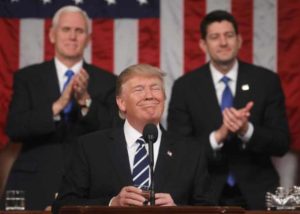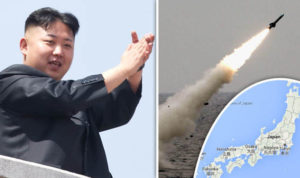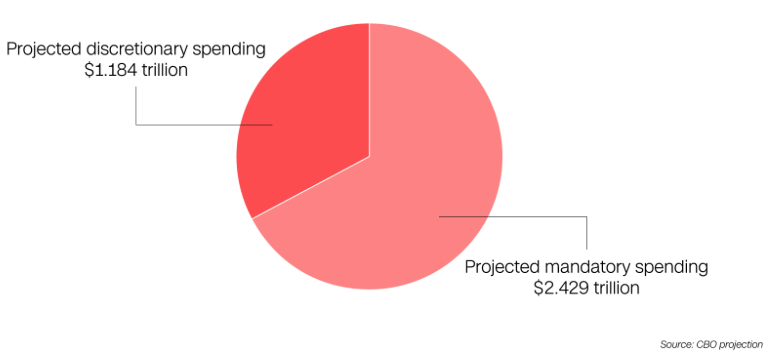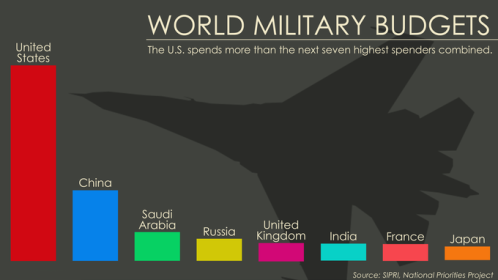 Listening to President Trump rail about how underfunded the US military is, you’d think President Obama spent the past eight years defunding the Department of Defense; you know, the way Trump is planning to defund the Department of Education.
Listening to President Trump rail about how underfunded the US military is, you’d think President Obama spent the past eight years defunding the Department of Defense; you know, the way Trump is planning to defund the Department of Education.
In 2014, the most recent year available, the United States led the world in military spending at $610 billion, marking 34 percent of the world total, SIPRI found.
US expenditures were nearly three times higher than China, the second-highest nation with an estimated $216 billion in military spending. Russia was in third place at $84.5 billion.
(Politifact, January 13, 2016)
In fact, the $610 billion the United States spent was more than the $601 billion the next seven countries spent that year – combined. More to the point, though, far from aping the Soviet Union by challenging the United States to an arms race, China is ceding the (pyrrhic) victory.
Defying pressure for a strong increase in defense spending, China said on Saturday its military budget this year would grow about 7 percent, its slowest pace since 2010.
Last year, with China’s economy slowing, the defense budget recorded its lowest increase in six years, 7.6 percent, the first single-digit rise since 2010, following a nearly unbroken two-decade run of double-digit increases.
With the administration of new US President Donald Trump proposing a 10 percent jump in military spending in 2017, and worries about potential disputes with the United States over the South China Sea and the status of Taiwan, some in China had been pressing for a forceful message from this year’s defense budget.
(Reuters, March 4, 2017)
In other words, the United States will be spending even more on military hardware it does not need. Meanwhile, nearly 50 million citizens remain mired in poverty. By enlightening contrast, China will be spending even less. This will enable it to continue lifting tens of million out of poverty each year.
Incidentally, the United States spends 3.3 percent of GDP on defense; China spends 1.3 percent. But it’s misleading to cite the roughly 10 percent the United States spent during the 1980s to justify any increase today.
Not least because, back then, there was relative parity between mandatory spending for programs like Social Security, Medicaid, Medicare, and Interest on the Debt, and discretionary spending for programs like Defense, Education, Health and Human Services, and other agencies (like the EPA).
Today, mandatory spending consumes nearly 70 percent of the federal budget. What’s more, of the 30 percent left for discretionary spending, defense spending already consumes over half (16.2).
This is why there’s no way Trump can reconcile his promises to spend over $600 billion on defense and $1 trillion on infrastructure, especially given his promise to lower taxes to boot. He can only do so if he’s prepared to rack up Obama-like deficits and explode the national debt. Except that he spent most his campaign denouncing Obama for doing so.
Mind you, Obama could justify his spending as absolutely necessary to prevent another Great Depression. Trump, however, cannot offer any credible justification. Not least because, unlike Obama, he inherited a booming economy and greatly reduced military obligations (notably in places like Iraq and Afghanistan).
 George H.W. Bush famously described Ronald Reagan’s attempt in 1980 to reconcile similar budgetary promises as voodoo economics. That description is even more apt today with respect to Trump’s attempt.
George H.W. Bush famously described Ronald Reagan’s attempt in 1980 to reconcile similar budgetary promises as voodoo economics. That description is even more apt today with respect to Trump’s attempt.
That said, China has clearly learned from the Soviet Union’s mistake. Reducing its military expenditure below 2 percent of GDP demonstrates this. After all, nothing hastened the disintegration of the Soviet Union quite like its misguided folly of measuring its status as a superpower primarily by the size of its military.
Specifically, instead of using military power to exert fleeting influence around the world (the way America and Russia did during the Cold War), China is using hard cash to buy vesting influence. I have commented on this enlightened feature of its foreign policy in many commentaries, including “China Buying Political Dominion Over the Caribbean (Latin America and Africa),” February 22, 2005, and “China Buying the Global Influence Russia and US Fighting For,” October 19, 2016.
The above explains why it is so mindboggling that the United States seems hell-bent on committing the same blunder that doomed the Soviet Union. For it too is now building up its military at the expense of the general welfare of its people. Only this explains Trump’s proposals to cut spending on everything from education to healthcare and the environment..
Many in Washington are rationalizing this build up by arguing that China is becoming the military threat the Soviet Union was – notwithstanding clear and convincing evidence to contrary. Alas, the mercenary demands of the military industrial complex, which former President Dwight D. Eisenhower famously warned about, compels them to do so.
But I’ve been in the vanguard of those pooh-poohing that argument – as I did in “China’s First Aircraft Carrier Incites (More) Irrational Fear,” June 9, 2011.
_____________________
Given the relatively small amount it is spending on its military, China seems to fully appreciate that having a superpower economy and an ordinary military is far more sustainable than vice versa – as the Soviet Union found out.
On the other hand, the United States seems blithely unconcerned about this foreboding precedent. Only this explains the way it is turning its superpower economy into an ordinary one with spendthrift military adventures (like those in Afghanistan, Iraq, Libya and now Yemen), all of which benefit only a few war profiteers. But the categorical imperative of managing this symbiotic relationship between economic and military power couldn’t be any clearer.
Apropos of the United States spending way beyond its means, the March 10, 2011, edition of CNN quotes no less a person than US Chairman of Joint Chiefs Adm. Mike Mullen saying that
‘The world’s biggest debtor nation cannot remain the world’s sole superpower indefinitely.’
_____________________
This brings me to the contradiction inherent in Trump, on the one hand, complaining about the United States defending rich countries (like Germany, Saudi Arabia, and Japan), while on the other hand, insisting that America’s military must remain bigger than the next seven military powers combined.
Of course, Trump probably has no clue about the role Mutual Assured Destruction (MAD) has played in preventing military confrontation among the world’s major powers since WWII. But this MAD doctrine explains why, despite Russia’s mischief making and adventurism in Europe, it has not dared to launch military aggression against any NATO country. Russia knows that doing so could trigger a nuclear conflagration.
 But Trump need only look at the mockery North Korea has made of America’s military (super) power. For it has shown that America – with an arsenal of nearly 7,000 nuclear weapons – doesn’t dare attack a country so poor it can’t even feed itself, if that country could retaliate with just one nuclear weapon. Exhibit A in this respect is America picking on countries like Grenada, Panama, and Iraq, but leaving North Korea well enough alone.
But Trump need only look at the mockery North Korea has made of America’s military (super) power. For it has shown that America – with an arsenal of nearly 7,000 nuclear weapons – doesn’t dare attack a country so poor it can’t even feed itself, if that country could retaliate with just one nuclear weapon. Exhibit A in this respect is America picking on countries like Grenada, Panama, and Iraq, but leaving North Korea well enough alone.
As it happens, North Korean President Kim Jong-un reinforced this MAD asymmetrical fact just hours ago. Specifically, he conducted yet more ballistic missile tests, daring self-proclaimed strongman Donald Trump to put up or shut up.
After all, Trump made quite a show during his presidential campaign of vowing that North Korea would never dare conduct such tests if he, not the “weak Obama,” were president. Yet I’ve already had cause to ridicule his inability to put up in “Trump ‘Leading from Behind’ as World Reacts to (Latest) North Korean Nuclear Test,” February 14, 2017.
But all of this raises the question: Why spend $600 million a year on military armaments when a country can defend itself at home and exercise its power abroad, just as effectively, for just one-third of that amount?
This, after all, is precisely what China is doing — complete with exercising its power in the South China Sea; what Russia is doing — complete with exercising its power in Syria; and what England did — complete with exercising its power in the Falklands.
Not to mention that Trump is compounding the folly of military spending by reducing funding for “soft power,” scaling back development of alternative fuels, and rolling back regulations for environmental protection; whereas China is increasing funding, ramping up development, and implementing regulations of the same, respectively.
 The juxtaposition of these and other American and Chinese policies means that, in due course,
The juxtaposition of these and other American and Chinese policies means that, in due course,
- China will have the biggest economy in the world;
- China (with a population of 1.3 billion) will have a per capita income that rivals that of the United States (with a population of just 319 million);
- China will have air and water that will make other countries green with envy.
But, hey
- The United States will still have the biggest military – by a “yuge” margin.
But the aforementioned soft-power plank of Trump’s penny-wise, pound-foolish policies deserves further comment. Not least because the $25 billion the Department of Defense wastes each year could nearly fund the entire Department of State, which executes soft-power initiatives.
Yet, while calling for a wanton increase in spending for the Department of Defense, he is calling for an ill-advised decrease in spending for the Department of State, including a “dramatic cut” in foreign aid (which accounts for less than 1 percent of the federal budget).
This decrease in spending willfully ignores expert assessments that diplomacy and aid are indispensable – not only for avoiding wars, but even for winning them. Here, for example, is how no less a person than former Defense Secretary Robert M. Gates framed this symbiosis nearly a decade ago:
Defense Secretary Robert M. Gates called yesterday for a ‘dramatic increase’ in the US budget for diplomacy and foreign aid, arguing that al-Qaeda does a better job than Washington of communicating its message overseas and that US deployment of civilians abroad has been ‘ad hoc and on the fly.’
In a speech that emphasized the importance of ‘soft power’ to prevent and end conflicts, Gates suggested beefing up the Department of State’s foreign affairs budget of $36 billion, even as he acknowledged that Pentagon observers might consider it ‘blasphemy’ for a sitting defense secretary to make such an appeal for another agency.
‘One of the most important lessons of the wars in Iraq and Afghanistan is that military success is not sufficient to win.’
(Washington Post, November 27, 2007)
Frankly, Trump’s plan to cut foreign aid makes even less sense than his plan to ban immigrants. Like the former, the latter is supposed to make America safe(r). The problem is that, when it comes to violent crimes, statistics show that America has far more to fear from native-born citizens than refuge-seeking immigrants.
So Trump has it ass-backwards — again.
Related commentaries:
China first aircraft carrier…
China buying global influence…
China buying political dominion…
Trump leading from behind…

